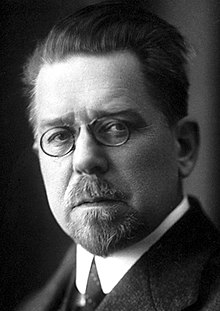1924 Nobel Prize in Literature
| Wladyslaw Reymont | |
 "for his great national epic, The Peasants" | |
| Date |
|
| Location | Stockholm, Sweden |
| Presented by | Swedish Academy |
| First awarded | 1901 |
| Website | Official website |
The 1924 Nobel Prize in Literature was awarded to the Polish author Wladyslaw Reymont (1867–1925) "for his great national epic, The Peasants".[1] He was the second Polish recipient of the literature prize after Henryk Sienkiewicz.
Laureate
[edit]Wladyslaw Stanislaw Reymont (1867–1925) wrote novels and short stories that was strongly influenced by naturalism. He is best known for Chłopi ("The Peasants", 1904–1909), a novel in four volumes that chronicles peasant life in Poland during the four seasons of the year, for which he specifically was awarded the Nobel prize. An earlier success was the novel Ziemia obiecana ("The Promised Land", 1899), which tells the story of three close friends and ruthless young industrialists: a Pole, a German and a Jew, struggling to build their own factory in the heartless world of the late 19th century labor exploitation.[2] His other well known works include Pielgrzymka do Jasnej Góry ("A Pilgrimage to Jasna Góra", 1895) and Bunt ("The Revolt", 1924)[2]
Nominations
[edit]Wladislaw Reymont was first nominated in 1919 by the Polish Academy of Arts and Sciences. It was followed in 1920, 1922 and 1924 wherein he was recommended by Nobel Committee members.[3] In total, the committee received 22 nominations for 18 authors which included Hugo von Hofmannsthal, Guglielmo Ferrero (who earned the three nominations - the highest), Thomas Hardy, Paul Ernst, Stefan Żeromski, Roberto Bracco, Paul Sabatier, George Bernard Shaw (awarded in 1925), . Three of the nominees were newly nominated: Thomas Mann (awarded in 1929), Max Neuburger and Olav Duun. There were two female nominees namely the Italian novelists Grazia Deledda (awarded in 1926) and Matilde Serao.[4]
The authors Marie-Louise-Félicité Angers (known as Laure Conan), Valery Bryusov, Frances Hodgson Burnett, Joseph Conrad, Jacob Israël de Haan, Herman Heijermans, Franz Kafka, Arnold H. S. Landor, Laura Jean Libbey, Lin Shu, Mary Mackay (known as Marie Corelli), Paul Milliet, Edith Nesbit and Gene Stratton-Porter died in 1924 without having been nominated.
| No. | Nominee | Country | Genre(s) | Nominator(s) |
|---|---|---|---|---|
| 1 | Roberto Bracco (1861–1943) | drama, screenplay |
| |
| 2 | Grazia Deledda (1871–1936) | novel, short story, essays | Carl Bildt (1850–1931) | |
| 3 | Olav Duun (1876–1939) | novel, short story | Oscar Albert Johnsen (1876–1954) | |
| 4 | Paul Ernst (1866–1933) | novel, short story, drama, essays | Professors[a] | |
| 5 | Guglielmo Ferrero (1871–1942) | history, essays, novel |
| |
| 6 | Thomas Hardy (1840–1928) | novel, short story, poetry, drama | Robert Eugen Zachrisson (1880–1937) | |
| 7 | Arno Holz (1863–1929) | poetry, drama, essays | Eugen Wolf (1850–1912) | |
| 8 | Einar Hjörleifsson Kvaran (1859–1938) | novel, poetry, drama, essays | Valtýr Guðmundsson (1860–1928) | |
| 9 | Thomas Mann (1875–1955) | novel, short story, drama, essays | ||
| 10 | Max Neuburger (1868–1955) | history, essays | Adolf Fonahn (1873–1940) | |
| 11 | Władysław Reymont (1867–1925) | novel, short story | Anders Österling (1884–1981) | |
| 12 | Paul Sabatier (1858–1928) | history, theology, biography | Carl Bildt (1850–1931) | |
| 13 | Matilde Serao (1856–1927) | novel, essays | Francesco Torraca (1853–1938) | |
| 14 | George Bernard Shaw (1856–1950) | drama, essays, novel | Tor Hedberg (1862–1931) | |
| 15 | Hermann Türck (1856–1933) | essays, biography |
| |
| 16 | Hugo von Hofmannsthal (1874–1929) | novel, poetry, drama, essays | Walther Brecht (1876–1950) | |
| 17 | Ludwig von Pastor (1854–1928) | history | Olof Kolsrud (1885–1945) | |
| 18 | Stefan Żeromski (1864–1925) | novel, drama, short story | Richard Ekblom (1874–1959) |
Notes
[edit]Presentation
[edit]As no official award ceremony took place, Per Hallström, chairman of the Nobel committee of the Swedish Academy, wrote a critical essay on Reymont in lieu of a presentation speech. In it he concluded:
To sum up, this epic novel is characterized by an art so grand, so sure, so powerful, that we may predict a lasting value and rank for it, not only within Polish literature but also within the whole of that branch of imaginative writing which has here been given a distinctive and monumental shape.[5]
References
[edit]- ^ The Nobel Prize in Literature 1924 nobelprize.org
- ^ a b "Wladislaw Stanislaw Reymont". britannica.com.
- ^ "Nomination archive - Wladislaw S Reymont". nobelprize.org.
- ^ "Nomination archive - Literature 1924". nobelprize.org.
- ^ "Presentation". nobelprize.org.
External links
[edit]- Presentation A critical essay by Per Hallström, chairman of the Nobel committee of the Swedish Academy

